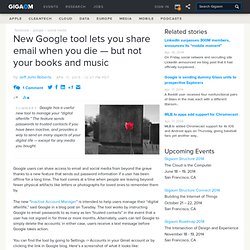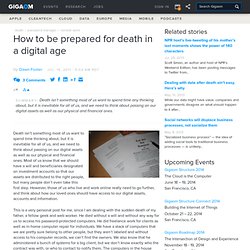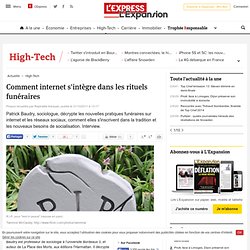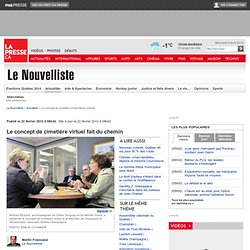

New Google tool lets you share email when you die — but not your books and music. Google users can share access to email and social media from beyond the grave thanks to a new feature that sends out password information if a user has been offline for a long time.

The tool comes at a time when people are leaving beyond fewer physical artifacts like letters or photographs for loved ones to remember them by. The new “Inactive Account Manager” is intended to help users manage their “digital afterlife,” said Google in a blog post on Tuesday. The tool works by instructing Google to email passwords to as many as ten “trusted contacts” in the event that a user has not signed in for three or more months. Alternately, users can tell Google to simply delete the accounts; in either case, users receive a text message before Google takes action.
You can find the tool by going to Settings -> Accounts in your Gmail account or by clicking the link in Google blog. “Digital content purchased on Google Play is licensed to the individual account holder personally. How to be prepared for death in a digital age. Death isn’t something most of us want to spend time thinking about, but it is inevitable for all of us, and we need to think about passing on our digital assets as well as our physical and financial ones.

Most of us know that we should have a will and beneficiaries designated on investment accounts so that our assets are distributed to the right people, but many people don’t even take this first step. However, those of us who live and work online really need to go further, and think about how our loved ones should have access to our digital assets, accounts and information. This is a very personal post for me, since I am dealing with the sudden death of my father, a fellow geek and web worker. He died without a will and without any way for us to access his password-protected computers.
He did freelance work for clients as well as in-home computer repair for individuals. Here are a few things that you should consider: Password management. Photo used courtesy of Ken Mayer. Dealing with data after death ain’t easy. Here’s why. If you want to know what happens to your online data after your death, you won’t get a clear answer. At the moment, it depends — on various companies’ terms of service, the state you live in and whether you’ve given another person access to your data — even though the data can have plenty of value, lawyer Stephen Wu pointed out at UC Berkeley’s DataEDGE conference on Friday.
First, Wu showed how, at least in California, digital data could be viewed as property just like physical property that an executor of a will should be able to obtain with a court order. “‘Property’ means anything that may be the subject of ownership and includes both real and personal property and any interest therein,” California probate code states. And it turns out the data can have value. A recently deceased writer might have stored a breakthrough novel in her Dropbox, or she might have valuable assets on Second Life. “What happens to that music upon death? Literal money could also get lost, Wu said. Comment internet s'intègre dans les rituels funéraires. Mémoriaux en ligne, cimetières virtuels, oraison de "RIP" sur les réseaux sociaux à chaque décès d'une personnalité...

Patrick Baudry est professeur de sociologie à l'université Bordeaux 3, et auteur de La Place des Morts, aux éditions l'Harmattan. Il décrypte le sens de ces nouvelles pratiques numériques. Vous travaillez notamment sur les attitudes devant la mort, les jeunes générations et les cultures urbaines. Quelles nouvelles pratiques funéraires issues du numérique ont retenu votre attention? Je me suis intéressé aux cimetières virtuels: certains cimetières donnent la possibilité d'accéder virtuellement à la tombe - réelle - du défunt, de la visualiser, d'y déposer un mot ou des fleurs.
C'est aussi un changement dans les temporalités. Internet contribue-t-il à recréer du rituel dans un domaine que l'on ne veut plus montrer, et où il disparait peu à peu? Les rites ont toujours évolué. En quoi internet répond-il aux besoins de nouveaux rituels? Le concept de cimetière virtuel fait du chemin. L'idée n'est pas complètement nouvelle.

Des firmes privées et des salons funéraires, notamment aux États-Unis, offrent cette possibilité à des particuliers qui souhaitent léguer du matériel graphique, vidéo ou audio sur support informatique. Le hic, c'est que personne ne peut assurer une pérennité à ces legs qu'on souhaite laisser, comme une trace de notre passage sur terre. Andréa Richard, ex-religieuse qui a mené plusieurs combats pour la laïcité, s'intéresse à cette idée de «cimetière virtuel».